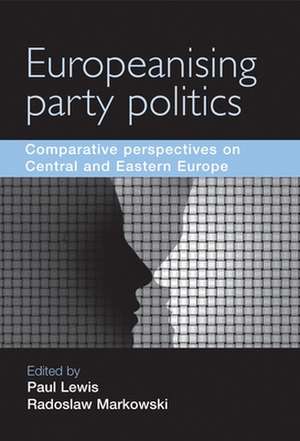Europeanising Party Politics
en Limba Engleză Hardback – iul 2011
Preț: 524.60 lei
Preț vechi: 739.07 lei
-29% Nou
Puncte Express: 787
Preț estimativ în valută:
100.38€ • 109.38$ • 84.59£
100.38€ • 109.38$ • 84.59£
Carte indisponibilă temporar
Doresc să fiu notificat când acest titlu va fi disponibil:
Se trimite...
Preluare comenzi: 021 569.72.76
Specificații
ISBN-13: 9780719082979
ISBN-10: 0719082978
Pagini: 254
Dimensiuni: 157 x 236 x 28 mm
Greutate: 0.59 kg
Editura: MANCHESTER UNIVERSITY PRESS
ISBN-10: 0719082978
Pagini: 254
Dimensiuni: 157 x 236 x 28 mm
Greutate: 0.59 kg
Editura: MANCHESTER UNIVERSITY PRESS
Cuprins
1. Introduction: Europeanising party politics? Central and Eastern Europe
after EU enlargement, by Paul G. Lewis
2. Party management and state colonisation in post-communist Europe:
the European dimension, by Petr Kopecký and Maria Spirova
3. Political parties and their consolidation in post-communist new
democracies: indirect and direct impacts from EU enlargement, by
Geoffrey Pridham
4. Changing patterns of political participation, by Mitja Hafner-Fink,
Danica Fink-Hafner and Alenka KraSovec
5. Voter turnout and electoral success of pro-European parties in post
communist Europe, by Mikolaj Czesnik
6. Patterns of party competition, by Zsolt Enyedi and Fernando Casal
Bértoa
7. The radical right in post-communist Europe: comparative perspectives
on party competition, by Lenka Bustikova and Herbert Kitschelt
8. The quality of social, partisan and governmental representation, by
Radoslaw Markowski and Zsolt Enyedi
9. (Shallow) Europeanisation and party system instability in post
communist states: how changing constraints undermine the
development of stable partisan linkages, by Robert Ladrech
10. Conclusion, by Radoslaw Markowski
Notă biografică
Descriere
A comparative, empirically-based study of party politics in Central and Eastern Europe that seeks to define the impact of European Union membership in this area. -- .
